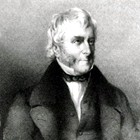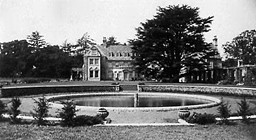 |
 |
The squire throws a memorable
party at the big house
by Rex Needle
| THE VILLAGE SQUIRE has found a permanent place in
our history as the man who ruled over his estate in varying degrees of
authority ranging from tyranny to benevolence but always the man at the
head of his rural community and therefore the one responsible for its
success or decline. The term originates from the days of chivalry and was used to describe the shield or armour bearer to a knight, being a shortened form of esquire, but eventually came to mean the leader or Lord of the Manor in an English village and later the key public figure such as a justice of the peace or Member of Parliament who lived in a large country mansion known locally as the big house. There were many squires in the Bourne area in past times but none quite so highly respected as William Augustus Johnson, a professional soldier who inherited the Witham estate in 1814 and ran it for almost half a century, becoming not only an M P but also a magistrate and High Sheriff of Lincolnshire, thus fulfilling the textbook requirements for his unofficial title. Johnson was born into a family of prominent clergymen in 1777 but after education at Rugby School, chose the military life and entered the army at the age of 16, being commissioned in the 32nd (Cornwall) Regiment in 1793. Promotion was swift and by 1803 he had become a major, subsequently serving in the Peninsular War and the disastrous Walcheren expedition in Holland where he survived deadly epidemics of dysentery and fever that took their toll on the British forces. But after inheriting the house and estate at Witham-on-the-Hill, four miles south west of Bourne, he left active military service to run it, a fortuitous decision because his regiment was part of the division that bore the brunt of Napoleon’s assault at Waterloo in 1815 when most of the officers were either killed or wounded. He remained on the army list and continued to receive promotions and so by 1841 he had become a lieutenant-general, an honorary rank for which he received no pay or pension provisions but it did entitle him to be called General Johnson which is how he has been remembered in the history of Bourne. One of the best examples of the consideration for others came in 1832 to show his pleasure over the passing of the Representation of the People Act, also known as the Reform Bill, which introduced wide-ranging changes to the electoral system in England and Wales, so ending abuses that had long prevailed over the election of members of Parliament. General Johnson, who had stood for Parliament several times and had been M P for Boston (1821-26), was a keen supporter of the legislation and on Wednesday 1st August that year, soon after the bill had become law, he summoned the entire village of Witham-on-the-Hill to the big house to celebrate the victory. The occasion was reported by the Stamford Mercury as “an entertainment in the old English fashion for all of the tenantry and labourers of Witham, Manthorpe, Toft and Lound, and to all other persons who thought it proper to join the jovial party”. Four sheep were slaughtered and cooked for the occasion and 183 people sat down to dinner which was served on tables set out on the lawn in front of the general’s house, the donor of the feast himself presiding. Every man had a quart of ale with his dinner and a ticket for another quart afterwards. In the afternoon, 127 women from the parish and hamlets were entertained with tea and cake “with the addition of a drop of comfort in the cups”. The bells of the village church rang merrily throughout the day, the Stamford, Bourne and Glinton ringers assisting on the occasion, and a good band of music in the evening gave spirit to a general dance which closed the festivities during a day of great enjoyment as ever was witnessed. “In the honest overflow of feelings”, reported the newspaper, “some of the tenantry suddenly seized the general, raised him aloft and chaired him through the village of Witham amidst the delighted shouts of the multitude, all eager to testify their grateful regard to the man whose kindness of disposition led him so to identify himself with his neighbours and to see his own gratification in the happiness of those around him.” There were other similar gestures during his time as Squire of Witham which ended in 1863. During the late autumn, he fell in his study and sustained a serious injury to his hip from which he never recovered. He died on 26th October, aged 86, and was buried the following week with due ceremony in the graveyard at St Andrew’s Church. "As a country gentleman and landlord, General Johnson was deservedly held in the highest respect", reported the Stamford Mercury. "He was at all times accessible and courteous and lived upon the best of terms with his neighbours, whether of high or low degree." In 1835, General Johnson had married Lucy Foster (1815-90), eldest daughter of the Rev Kingsman Foster, Rector of Dowsby. She was just 19 and he was 57 but they went on to have nine children, three boys and six girls, the youngest being born when he was in his seventies. By tradition, when he died the estate should have passed to his eldest son, Robert, but he had been killed at the age of 19 during an accident at Portsmouth dockyard while serving as a captain in the Royal South Lincoln Militia which was guarding the military depot there while the regular army were away fighting in the Crimean War. Instead, it went to his second son, Augustus Charles Johnson, who therefore became the new Squire of Witham and also High Sheriff of Lincolnshire (1869) and a county councillor. However, he was far less prudent than his father and was soon dogged by money troubles with his time being taken up negotiating loans and mortgages while his relationship with tenants and workers suffered. He eventually sold the estate in 1902, leaving Witham never to return except to be buried in the churchyard when he died in 1910, aged 73. Since then, there have been other owners of the Witham estate but today the big house is home to a private school. |